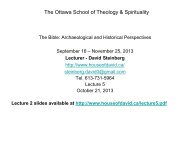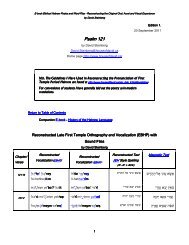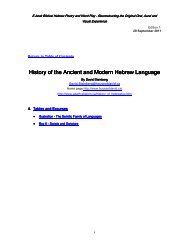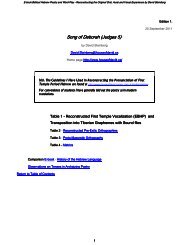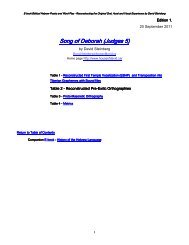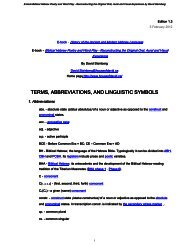Biblical Hebrew Poetry - House of David Steinberg
Biblical Hebrew Poetry - House of David Steinberg
Biblical Hebrew Poetry - House of David Steinberg
Create successful ePaper yourself
Turn your PDF publications into a flip-book with our unique Google optimized e-Paper software.
38<br />
E-book<br />
<strong>Biblical</strong> <strong>Hebrew</strong> <strong>Poetry</strong> and Word Play - Reconstructing the Original Oral, Aural and Visual Experience by <strong>David</strong> <strong>Steinberg</strong><br />
frequently undergo lengthening; it is likely that these two opposed tendencies were operative at<br />
different periods: e.g. *dabarῑm > dəbārῑm; *qābarū > qābərū.<br />
23 See O'Connor 2004<br />
24 See von Dassow 2004, Rainey 1996.<br />
25 See Bennett 1998<br />
26 Blau 1976/93<br />
27 Blau 1993 p. 213.<br />
28 Garr 1991 pp. 71-72 and Blau 2010 §3.5.9.2.<br />
29 This is emphatically Blau's view. See Blau 1976, Blau 2010. It is also the position <strong>of</strong> Bergstärsser and others.<br />
30 This is the view <strong>of</strong> Huehnergard and others.<br />
31 For the Proto-<strong>Hebrew</strong> verbal and case system see Young, Rezetko, Ehrensvärd 2008 chapt. 12.<br />
32 See Blau 2010 §3.5.12.2.4.<br />
33 See Blau 2010 §4.4.4; Hendel-Lambdin-Huehnergard p. 17.<br />
34 Blau 1976/93 pp. 30-31. Garr 1985 pp. 34-35 wrote (n.b. I have slightly modified his orthography for lengthened<br />
vowels for typographic convenience) -<br />
As inferred from the Masoretic vocalization, *á in nouns was stress-lengthened, whereas in verbs it<br />
remained [á] [n.<br />
Ginsberg 1936 p. 139; Brockelmann, review <strong>of</strong> Harris 1936 OZL 40 (1937) and Harris<br />
1939 p. 72]. Although there is no evidence for the quantity <strong>of</strong> this vowel in the epigraphic texts, the<br />
consistency with which BH treats nominal vs. verbal *á suggests that the Masoretic rules were operative<br />
in the epigraphic texts as well.... The dialectical status <strong>of</strong> Ammonite, the Deir Alla dialect, Moabite and<br />
Edomite, in this respect, is unknown.... Whereas *á in <strong>Hebrew</strong> forms was only stress-lengthened to [áː], in<br />
Phoenician *á was stress-lengthened to *áː and was then treated as an originally long, accented *ā,<br />
becoming [óː]*. <strong>Hebrew</strong> distinguished (stressed) *ā from (stressed) *â and *á ; the first always shifting to<br />
[óː], the second shifting only when *â resulted from *aʾ in a doubly closed syllable, and the third retaining<br />
its quality but lengthening to [áː] in nouns but remaining [á] in verbs.<br />
* See also Fox 1996 p. 38.<br />
35 Due to words in the construct carrying secondary stress. See Blau 2010 §3.4.5.5n.<br />
36 From Blau 2010 §3.5.7.1.5 -<br />
(I)t seems reasonable to posit that in construct (and the finite verb) the final short vowels were dropped at<br />
an earlier period than they were from absolute forms. At this earlier period, no law <strong>of</strong> compensation yet<br />
operated. When it started operating, the final vowels in the construct forms already stood in closed<br />
syllables and were, accordingly, not lengthened. The case endings were dropped first from the construct



